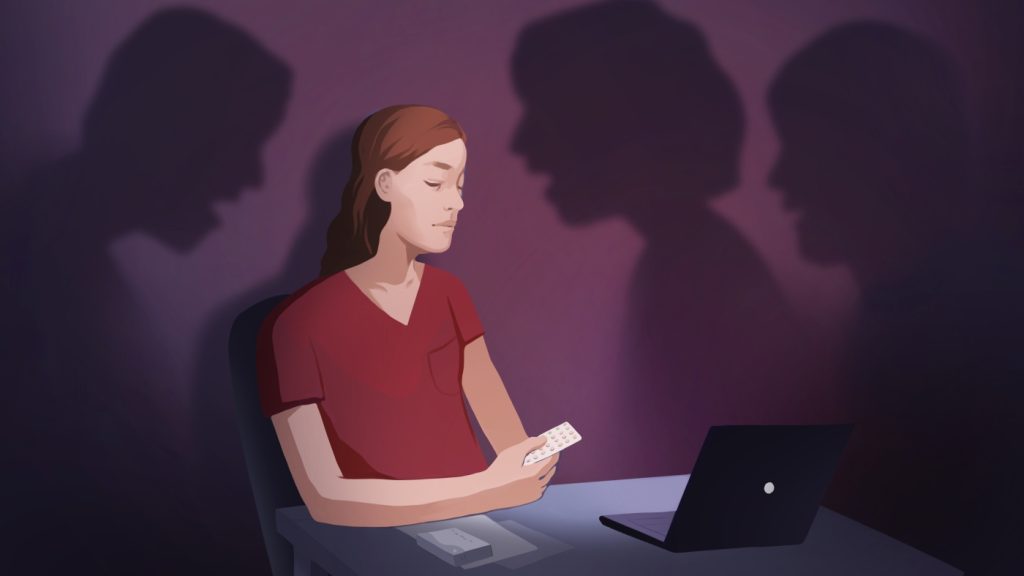Listen to the article
A growing number of women are questioning their use of hormonal birth control, driven by concerns about mental health effects and dissatisfaction with how medical professionals address potential side effects. This trend has gained momentum on social media platforms, where personal testimonials about quitting birth control have created a community of women seeking alternatives.
Charlotte Freed, who first received a hormonal IUD as a teenager, began questioning whether her experiences with anxiety, depression, and fatigue were connected to her birth control after eight years of use. “It was really upsetting and almost like a little disturbing that no doctor had ever brought it up,” said Freed, now 27.
Her decision to remove her IUD was motivated by a desire to “meet myself in a way that I hadn’t since I was 16, 17,” hoping to discover potential changes in her physical and emotional well-being without hormonal contraception.
The phenomenon of women abandoning hormonal birth control methods has flourished across social media platforms, with women sharing stories about mood changes, weight gain, nausea, and decreased sex drive—symptoms they say were often dismissed by healthcare providers.
Medical professionals, however, express concern about the spread of misinformation. Dr. Jennifer Lincoln, an Oregon-based OBGYN who creates content debunking birth control myths, worries about the impact of false claims. “Birth control is bad for you. It gives you infertility, it causes cancer, it makes you not attracted to your partner. It causes abortions—you name it, somebody on social media has said it,” Lincoln explained. “What makes me really sad is that there’s so many people who go to TikTok for like—that’s their Google search now.”
A 2024 study analyzing TikTok content about birth control found that nearly half of posts discouraged women from using it. Conservative podcast host Alex Clark, who stopped taking birth control pills after nearly a decade, argues that hormonal contraceptives are overprescribed and merely mask underlying conditions like endometriosis or polycystic ovary syndrome.
“I feel like women haven’t been given true informed consent when it comes to the hormonal birth control pill,” Clark said. “I don’t think that they’re being told that hormonal birth control isn’t going to actually cure or solve any hormonal issues or women’s health issues.”
Clark now advocates for non-hormonal alternatives like condoms and cycle tracking, though research shows these methods typically have higher failure rates than hormonal options.
Dr. Lincoln acknowledges that the medical community bears responsibility for driving women to seek information online. “The medical field owns so much of why people are going to these forums and Reddit and TikTok for information,” she said. “We have either brushed off their concerns—I mean, you could spend all day just talking about how so many women’s issues do not get adequately funded or addressed.”
This sentiment resonates with Freed’s experience. She reports receiving limited sex education in high school and finding her doctors unable to answer questions about potential mood effects from her IUD. “When asking about side effects, it would just be that, ‘You know, there’s a possibility that your period goes away. And there’s a possibility that you get ovarian cysts’—these types of things that are easier to track,” she recalled.
Dr. Wanda Ronner, professor of clinical obstetrics and gynecology at the University of Pennsylvania, points to the increasingly “corporatized” medical field as part of the problem. “You get your 10 minutes and that’s it,” Ronner said, describing the limited time doctors have with patients.
When Freed eventually removed her IUD, she noticed improvements in her mood, energy levels, and connection to her body, though she acknowledges she’ll “never really know if it was correlation or causation.” However, faced with studying abroad and unable to risk pregnancy in a foreign country, she ultimately got a new hormonal IUD inserted, though she’s considering another break.
“Thing that sucks about being a woman is like—either the trade off is, you know, the possibility of having a child when you don’t want to, the possibility of like hormones kind of messing up your personality or, you know, increasing anxiety, depression, fatigue, whatever, or having horrible cramps and bleeding for 12 days straight,” Freed said. “So it really is just like, it’s a lose-lose situation.”
Fact Checker
Verify the accuracy of this article using The Disinformation Commission analysis and real-time sources.




8 Comments
The concerns about mental health impacts of birth control are valid and deserve further research. However, we need to be cautious about unsubstantiated claims spreading on social media without proper medical context.
Absolutely. While personal testimonials can be powerful, they shouldn’t replace professional medical advice. Doctors need to have open dialogues with patients about all options and potential side effects.
I’m curious to see if this movement leads to more innovation and diversity in the contraceptive options available. More research into non-hormonal and natural methods could benefit many women.
That’s a great point. Expanding the range of safe, effective contraceptive choices would give women more control over their reproductive health. Hopefully this trend sparks more investment and development in that area.
It’s positive that women are taking a more proactive role in their healthcare, but the trend of abandoning hormonal birth control based on social media claims is concerning. Proper medical guidance is crucial here.
This is an interesting trend – women questioning the potential side effects of hormonal birth control. It’s good to see more open discussion around these issues, even if some claims may be misleading online.
I agree, more transparency from healthcare providers on the risks and alternatives would be helpful. Women should feel empowered to make informed decisions about their reproductive health.
While I understand the desire to avoid potential side effects, the risks of unintended pregnancy also shouldn’t be overlooked. Any changes to birth control should be made carefully in consultation with a doctor.